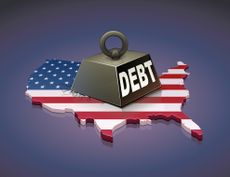Shortage of electrical engineers to power labor market growth: Kiplinger Economic Forecasts
A lack of skilled graduates and funding are contributing to the shortage.
- (opens in new tab)
- (opens in new tab)
- (opens in new tab)
- Newsletter sign up Newsletter


The fortunes of the labor market are the economic indicators we perhaps feel the most as individuals. For our labor market forecast, we use two distinct metrics. The first is the “payroll report” from the Department of Labor (opens in new tab), which indicates the number of jobs lost or created each month, and is broken up by sector. The other is a division of the number of people who have looked for work in the prior four weeks but who do not have a job, by how many people are currently in the labor force.
To help you understand this sector, our highly experienced Kiplinger Letter team will update you on major developments (Get a free issue of The Kiplinger Letter or subscribe). Here’s the latest forecast… Here is our latest labor market forecast…
As federal money flows to homegrown semiconductor manufacturing, a shortage of skilled workers looms.

Sign up for Kiplinger’s Free E-Newsletters
Profit and prosper with the best of expert advice on investing, taxes, retirement, personal finance and more - straight to your e-mail.
Profit and prosper with the best of expert advice - straight to your e-mail.
A case in point is electrical engineers, who will be in high demand over the next decade. The CHIPs and Science Act (opens in new tab), which doled out $53 billion in funding to domestic chip manufacturing and research, is poised to create tens of thousands of jobs that require electrical engineering degrees.
Not enough home-grown talent to power the labor market
U.S. colleges don’t come close to producing enough talent. Foreign students, without permanent resident status, obtain a large share of degrees from U.S. colleges in the field. They are effectively barred from filling vital positions in the military and other national security-sensitive sectors, and many leave after graduation.
To fill the gap, the U.S. will have to produce more electrical engineering college graduates. That will require boosting interest in the field among high schoolers and even young kids, plus revamping college curricula to keep kids in the major.
Overall graduation rates for electrical engineering majors are disappointing, according to expert analysis.
More funding is needed to fill shortages
More funding by the states will likely be needed to expand the overall electrical engineering slots. Immigration rules will also need to change for more grads to stay in the U.S., a challenge with such a contentious issue.
The chip industry will be lobbying hard. The field will see rising demand and has a very high average starting salary, around $111,000 per year, as of 2021. Plus, the chip industry will see exciting research and breakthroughs in the coming year and a whole lot more domestic manufacturing.
This forecast first appeared in the Kiplinger Letter, which has been running since 1925 and is a collection of concise weekly forecasts on business and economic trends, as well as what to expect from Washington, to help you understand what’s coming up to make the most of your investments and your money. Subscribe to the Kiplinger Letter or try a free issue.
Related content
- April Jobs Report Tops Expectations: What the Experts Are Saying
- Kiplinger's Jobs Outlook
- The Best Semiconductor Stocks

David is both staff economist and reporter for The Kiplinger Letter, overseeing Kiplinger forecasts for the U.S. and world economies. Previously, he was senior principal economist in the Center for Forecasting and Modeling at IHS/GlobalInsight, and an economist in the Chief Economist's Office of the U.S. Department of Commerce. David has co-written weekly reports on economic conditions since 1992, and has forecasted GDP and its components since 1995, beating the Blue Chip Indicators forecasts two-thirds of the time. David is a Certified Business Economist as recognized by the National Association for Business Economics. He has two master's degrees and is ABD in economics from the University of North Carolina at Chapel Hill.
-
-
 Career Transition? Three Steps to Protect Your Financial Health
Career Transition? Three Steps to Protect Your Financial HealthWhether you’ve been laid off or are moving on voluntarily, career transitions can be stressful, but there are ways to help tame the uncertainty.
By Krystal Barker Buissereth, CFA® • Published
-
 Stock Market Today: Stocks Slip as Consumer Sentiment Slides
Stock Market Today: Stocks Slip as Consumer Sentiment SlidesConcerns about the debt ceiling also weighed on stocks Friday.
By Karee Venema • Published
-
 SpaceX in Good Shape Despite Test Flight: Kiplinger Economic Forecasts
SpaceX in Good Shape Despite Test Flight: Kiplinger Economic ForecastsEconomic Forecasts SpaceX in good shape despite test flight concerns: Kiplinger Economic Forecasts.
By John Miley • Published
-
 Medicare Drug Price Negotiations Latest: Kiplinger Economic Forecasts
Medicare Drug Price Negotiations Latest: Kiplinger Economic ForecastsEconomic Forecasts Medicare drug price negotiations: Early signs have emerged of how these key talks will be handled.
By Matthew Housiaux • Published
-
 Virgin Orbit Failure Casts Cloud Over Space Voyages: Kiplinger Economic Forecasts
Virgin Orbit Failure Casts Cloud Over Space Voyages: Kiplinger Economic ForecastsEconomic Forecasts Virgin Orbit failure casts a cloud over space voyages but SpaceX could fill the void.
By Letter Editors • Published
-
 TikTok Ban Winners and Social Media Changes: Kiplinger Economic Forecasts
TikTok Ban Winners and Social Media Changes: Kiplinger Economic ForecastsEconomic Forecasts TikTok Ban winners, LinkedIn changes: Kiplinger's analysis of the massive social media cross-platform shake-ups.
By Letter Editors • Published
-
 Debt Ceiling Will Be Averted but It Won’t Be Easy: Kiplinger Economic Forecasts
Debt Ceiling Will Be Averted but It Won’t Be Easy: Kiplinger Economic ForecastsEconomic Forecasts Debt Ceiling Will Be Averted but It Won’t Be Easy: Kiplinger Economic Forecasts
By Sean Lengell • Published
-
 China to Benefit from U.S. Semiconductor Export Controls: Kiplinger Economic Forecasts
China to Benefit from U.S. Semiconductor Export Controls: Kiplinger Economic ForecastsEconomic Forecasts Washington wants to limit the use of more advanced tech overseas, which could fuel Beijing’s lower-tech sector
By Andrew Tanzer • Published
-
 Food Prices Fell in March But Are Still Way Up Year-on-Year: Kiplinger Economic Forecast
Food Prices Fell in March But Are Still Way Up Year-on-Year: Kiplinger Economic ForecastEconomic Forecasts The cost of food remains elevated but there is finally some good news for households.
By Matthew Housiaux • Published
-
 Canada’s Economic Slowdown Could Be Good for the U.S.: Kiplinger's Economic Forecasts
Canada’s Economic Slowdown Could Be Good for the U.S.: Kiplinger's Economic ForecastsEconomic Forecasts Canada’s Economic Slowdown Could Be Good for the U.S.: Kiplinger's Economic Forecasts
By Rodrigo Sermeño • Published









